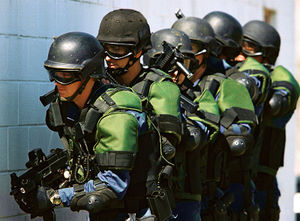
I write a lot about the excesses of law-enforcement officers during the course of their efforts to uphold one law or another. Doors kicked in, people killed, dogs shot, phone lines tapped, curfews imposed -- they're all examples of official overreaching at that unpleasant intersection of private activity and state disapproval. For some people, the implication of a lot of coverage of such abuses is that a little more scrutiny, improved oversight and the right people in charge will make law enforcement a much less perilous, much more respectful enterprise, which the people need not fear.
But what if that's not the case? What if, in many circumstances, we've handed police and regulators and enforcers of many stripes missions that are impossible to fulfill? It may be that we've assigned law-enforcers goals so frustratingly elusive that even angels could not resist the temptation to escalate tactics to insane extremes, trampling liberty and decency along the way.
Deranged escalation may best be represented -- for now -- by the
violent raid on the home of Berwyn Heights Mayor Cheye Calvo, during which his dogs were killed by armed and armored narcs apparently fearful that the pooches might resent the marijuana-suppressing intrusion. Yes, worse raids have deprived
people of their lives in the past -- Radley Balko has documented the bloody outcomes in
Overkill: The Rise of Paramilitary Police Raids in America (PDF). But when a creature of the state, however minor, like Calvo can't protect his own pets from police overstepping, you know we've stepped over a cliff.
But that leap into the void was probably inevitable given the government's obsession with achieving the impossible: eliminating the consumption of marijuana by Americans. Seventy years after
Reefer Madness, decades into the War on Drugs, a
survey by the World Health Organization still says that 42.4% of us have smoked grass.

That drug prohibition thing isn't going so well. And after a couple of consecutive lifetimes of failure, entering the homes of low-level government officials with guns blazing because somebody tried to deliver a package of forbidden weed to the house may suddenly take on a false patina of sanity to prohibitionists who have lost a bit of perspective.
The fact is, there have been a
lot of laws that are essentially unenforceable -- or whose enforcement results in unintended consequences that raise the frustration index for those given the thankless job of making sure we all toe the line. By and large, these laws are unenforceable because a relatively large segment of the population is unwilling to obey them, and they involve activities in which there's no victim -- nobody to file a complaint or cooperate with police.
The dirty little secret of law enforcement is that it's largely dependent on public cooperation -- to obey the law and to help the police bring transgressors to heel. When laws represent something less than a near-universal consensus -- when they're nothing more than a majority preference jammed down the throats of an unwilling minority -- they're doomed to be defied. Cops then are relegated to the role of arm-twisters, trying to intimidate the minority into submission through increasingly brutal tactics, or else they just give up as an act of resignation or corruption.
Prohibition is infamous of course. Thirteen years of illegal liquor brought us mass disobedience, crooked cops, violence and an explosion of organized crime. From a
paper prepared in 1972 for the National Commission on Marihuana and Drug Abuse:
Other statistics demonstrated the increasing volume of the bootleg trade. In 1921, 95,933 illicit distilleries, stills, still works and fermentors were seized. in 1925, the total jumped to 172,537 and up to 282,122 in 1930. In connection with these seizures, 34,175 persons were arrested in 1921; by 1925, the number had risen to 62,747 and to a high in 1928 of 75,307 (Internal Revenue, Service, 1921, 1966, 1970: 95, 6, 73). Concurrently, convictions for liquor offenses in federal courts rose from 35,000 in 1923 to 61,383 in 1932.
The law could not quell the continuing demand for alcoholic products. Thus, where legal enterprises could no longer supply the demand, an illicit traffic developed, from the point of manufacture to consumption. The institution of the speakeasy replaced the institution of the saloon. Estimates of the number of speakeasies throughout the United States ranged from 200,000 to 500,000 (Lee, 1963: 68).
A history of that particular legal fiasco should be a required course for any aspiring legislator or law-enforcer. Even without formal instruction, though, you'd think the lesson would stick -- but it hasn't. Lawmakers still insist on sending the police to force people to stop doing things they want to do, even when there's nobody to complain and little interest in compliance.
So we see police breaking up friendly card games with
headline-grabbing raids -- even in jurisdictions where the law
doesn't prohibit playing cards for money -- only
profiting from promoting the same. Sure the games continue, only now a bit further underground -- but at least those
nefarious card players had the Hell scared out of them.
People then turn to the Internet for their gambling fix. What's the government going to do about that?
Try something else crazy, it turns out -- like
arresting former executives of companies
based in countries where online gambling is
perfectly legal who merely change planes in the United States. That's like Saudi Arabian cops busting a Playboy employee because naughty pictures published on American Websites are frowned on in Islamic countries.
That enthusiasm for enforcing the unenforceable at all costs should have all of us -- gun control advocates included -- thanking the Supreme Court for saving us from ourselves by taking outright gun bans off the table with the
Heller decision.
Why?
Because gun owners have a
history of defying gun control laws. Because the authorities would be inclined, given their past efforts, to escalate enforcement. And because resistance to such escalation would inherently involve, you know,
guns.
In his book,
Can Gun Control Work?, James B. Jacobs, Warren E. Burger Professor of Law and Director of the Center for Research in Crime and Justice at New York University, and an advocate of firearms restrictions, looked at the issue logically and concluded, "If black market activity in connection with the drug laws is any indication, a decades-long 'war on handguns' might resemble a low-grade civil war more than a law-enforcement initiative."
And there's drug prohibition again -- the eternally failed crusade to make much of the population change its sinful (in the eyes of the crusaders) ways,
or else.
It won't work. It can't work.
It never has worked.
But the authorities try, and try and
try to make people knuckle under to laws that they find offensive and intrusive. And as people refuse to comply, the authorities raise the stakes, adopting tactics that most of us recognize as violations of civil liberties, of fundamental rights and of simple human decency.
Yes, I have a bone to pick with the cops when they
kick in doors,
plant evidence and
shoot the innocent.
But I suspect that I'd have remarkably little to write about if lawmakers refrained from sending law-enforcers to do the impossible.
Labels: civil liberties, government out of bounds, kop kapers






